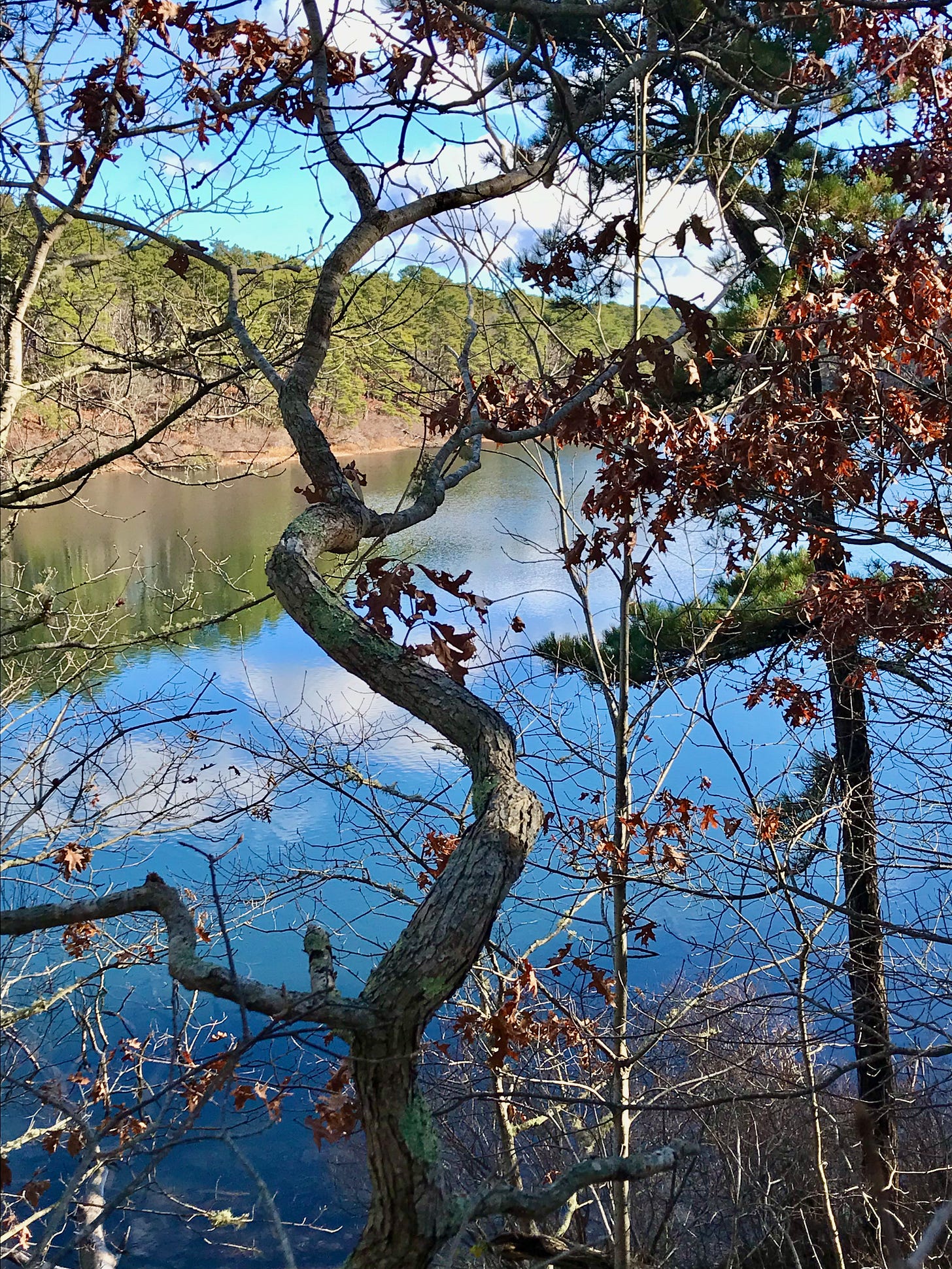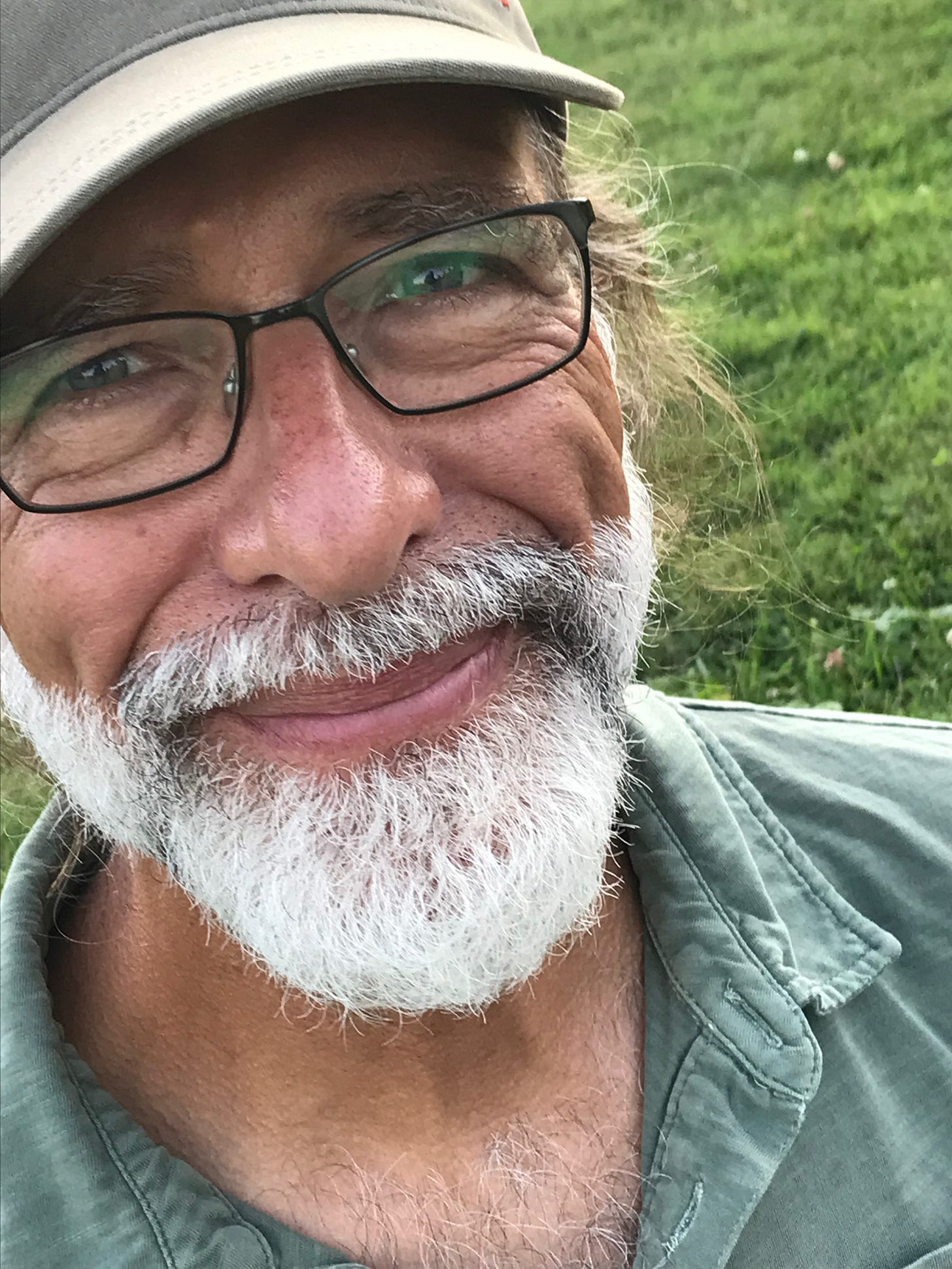You are reading Shy Guy Meets the Buddha: Reflections on Work, Love, and Nature. This weekly newsletter is always free, but if you’d like to show your support, a tip will help me continue the hard work behind these creative efforts; “Buy me a coffee” by clicking the button below. “Liking,” sharing, commenting, and subscribing will help promote my newsletter. Please take a few moments to show you care. Thank you! 💚
There is a public park of nearly a hundred wooded acres on the outskirts of my town. The area includes a network of trails, and my favorite is the one that circumnavigates the property’s namesake, Hathaways Pond. The dirt and gravel path is mostly covered with last year’s dry pine needles, offering a quiet step and a peaceful, reflective walk. Following this path through the trees, sometimes alongside the gently rippling, clear waters of the pond and sometimes away from the shore into the shady pitch pine and oak forest, I often marvel at the signs of life around me: the standing and fallen trees traced with insect burrows, the blue jays and eastern towhees squawking and dashing from one branch to the next. But probably more often, I find myself lost in thought.
Yesterday, about half way around the pond, I found myself reflecting on the book I’m currently reading, The Mind and the Way: Buddhist Reflections on Life, by an American monk named Ajahn Sumedho, whom I’ve read before. Actually, I was thinking about the author himself and how I admire him, and I guess the thought must have come into my head that I wish I could be like him; be really smart, speak comfortably to large groups, publish a bunch of books, etc. I must have then admonished myself for envying another man, because I found myself thinking the following thoughts:
You and he are exactly the same, Don. You have the same body, the same eyes and nose and mouth and limbs. You both see things in red and green and blue. You both smell the same flowers and the same garbage, you hear the same sounds, and walk through woods or along sidewalks with the same legs in the same way; one foot first, then the other.
Ajahn Sumedho, like you, surely burns his tongue on his coffee occasionally, cries out when he steps on a nail, bleeds when he cuts himself shaving. He probably argues with his wife from time to time, laments the violent state of the world, wonders if he is as happy as he could be, or should be. Maybe he feels like a failure when he hasn’t sold a book in a while, or wonders if he will ever be able to write another. Maybe his wife says, I don’t love you anymore, or, Your chewing is really annoying. Maybe he wonders if he’s been on the right path all his life, or if all his efforts have been for naught. He laughs at funny jokes, reads good books, goes to the doctor when he is sick or in pain. He may fall victim, even if only for a moment, to that punch of anxiety when his checking account gets too low, when the furnace breaks or the car repair bill runs into the thousands.
He is not better than you and does not live a better life than you.
(Later I remembered that Ajahn Sumedho is a celibate monk, retired now, who owns no property of his own. He did, however, lead and manage the affairs of a large monastery in England. For the sake of universality, I am going to leave my thoughts about him as they are, as they still apply; monks are no more impervious to the ups and downs of life—called samsara in Buddhist teachings—than anyone else.)

That’s the gist of it; that the person you think is better than you is not. They are exactly the same as you; flesh and blood, with a mind that thinks and worries and wonders, and emotions that are positive or negative.
And this. If a person you admire or envy is better at, say, public speaking (or singing or investing or writing or building houses...), do you think that is a big important thing that makes them radically different than you? It is not. It does not. That is a minor thing. And certainly not a thing that makes them better, happier, or more well-adjusted to life and relationship and living in this world.
When you envy another, it is because in your mind you have created a conceptualization of that person that you see as so much better than the sad state of affairs you see your own life as (also only a concept). The key point here is that it is in your mind. If you could actually become that person for a day or a week you would find that you still see the world outside yourself as better somehow than the one you are currently residing in. You are still not satisfied. And that is because being a human being, identifying as an individual, any individual, is inherently not satisfying. In the words of Sumedho himself, “Things are always incomplete or imperfect, even when you get everything you want.”
It doesn’t matter who you are, how rich you are, how evolved or enlightened, how healthy, how talented, how well-loved or admired, how famous. You will not be satisfied until you stop asking for satisfaction. Until the entire question of personal fulfillment comes to an end. Until you realize that desiring to be satisfied is what is making you unsatisfied. Not any lack that you perceive, not any injustice or unfairness in the world, not any imbalance in talent or ability or success or beauty. No, it all comes down to one simple issue. Desire. You want to be satisfied. You want to be happy. You want to be fulfilled. You want to BE something, and the implication there is that you are not already good enough as you are right here and right now. That is the problem. And identifying this problem should reveal its solution: Acceptance. Accepting things as they are. Right now, right here where you sit or stand, breathing in the truth of what is without resistance, judgement, rejection or approval. Being okay with it now.

To be clear on this idea of acceptance; acceptance of what is does not mean giving up on your dreams, submitting to injustice, or endorsing bad behavior (in yourself or in others). It is simply acceptance of what is happening right now, without that psychological resistance that causes a lot of suffering. It’s not fatalism or submission, it’s empowerment, because it is only when you can fully accept what is—what you look like, what your finances are, where you live and under what conditions you have been raised, what people think of you—and stop resisting, rejecting, bemoaning your lot, stop expecting others to change or trying to force the world to meet your needs, that you can actually move forward with a life that feels right to you. Again in the words of Sumedho:
There’s a sense of trust and confidence, a fearlessess that comes through learning to trust, to relax, to open to life, and to investigate experience rather than to resist or be frightened by it.
The author calls that place you find yourself in when you fully let go of your resistance to reality the “quiet center,” or the “still-point.” It’s the best place to be. It feels similar to walking on a peaceful wooded path on a warm sunny day.
Wait! Before you go, will you take one moment to hit that SHARE button? This one simple action can be surprisingly effective at helping spread the word and build my readership. Thank you! And remember, subscribing is free and easy, and tips are very much appreciated. 💚
All photos by Don Boivin unless otherwise credited
And finally, in the spirit of tree-love, which seems to be developing into a theme of my entire newsletter oeuvre, I would like to share a link to a poem I really enjoyed this week by fellow Substack writer,
, called “tree-silence.” I hope you enjoy it as much as I did!










This is a beautiful exploration, Don. Thank you for sharing. The bit about satisfaction and desire made me think of this exchange between dancers/choreographers Agnes De Mille and Martha Graham:
"I confessed that I had a burning desire to be excellent, but no faith that I could be.
Martha said to me, very quietly: “There is a vitality, a life force, an energy, a quickening that is translated through you into action, and because there is only one of you in all of time, this expression is unique. And if you block it, it will never exist through any other medium and it will be lost. The world will not have it. It is not your business to determine how good it is nor how valuable nor how it compares with other expressions. It is your business to keep it yours clearly and directly, to keep the channel open. You do not even have to believe in yourself or your work. You have to keep yourself open and aware to the urges that motivate you. Keep the channel open. As for you, Agnes, you have so far used about one-third of your talent.”
“But,” I said, “when I see my work I take for granted what other people value in it. I see only its ineptitude, inorganic flaws, and crudities. I am not pleased or satisfied.”
“No artist is pleased.”
“But then there is no satisfaction?”
“No satisfaction whatever at any time,” she cried out passionately. “There is only a queer divine dissatisfaction, a blessed unrest that keeps us marching and makes us more alive than the others.”
Beautifully written Don. Thank you.
On the flip side of those people we’d be tempted to envy are those that aggravate us, disgust us, or for whatever reason leave us unsettled. That could be any of dozens of people that are bombarded on our senses daily, either directly or indirectly through some media source or a stranger walking past us on the street. As tempting as it is to judge them, think degrading thoughts, or read into the situation our own preconceived ideas and opinions, remember they too are humans made of the same cells and chemicals as yourself, people with humanly flaws not unlike your own now or in the past, or what one could become if not careful. We are all flawed; it’s part of being human, and in the big picture none of it is permanent, none of it will be eventually remembered or matter in some future time (like we’d be around to know). Essentially star dust, formed long ago and reformed many times since and to be reformed many times yet to come; a small speck of a nanosecond in a time scale beyond anyone’s comprehension.
Although I can think and type this all out, I’m hyper-analytical by nature, which means I’m judgmental by nature. These things are hard to overcome, but we must never stop trying.